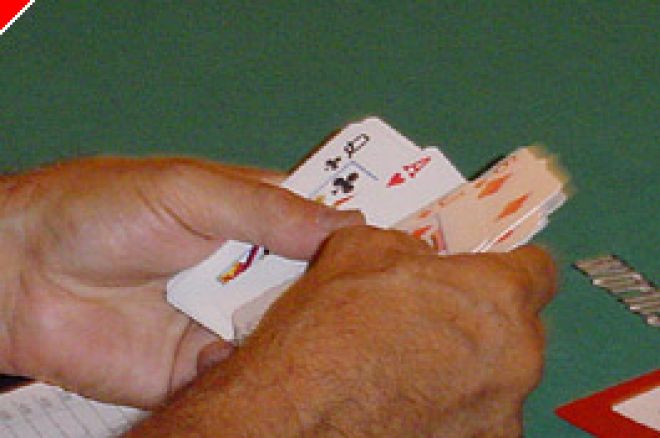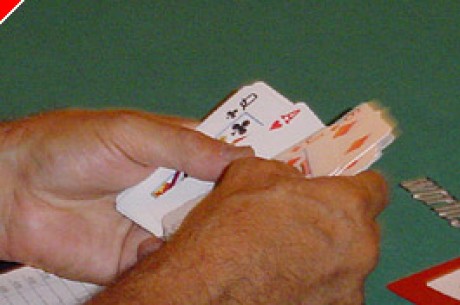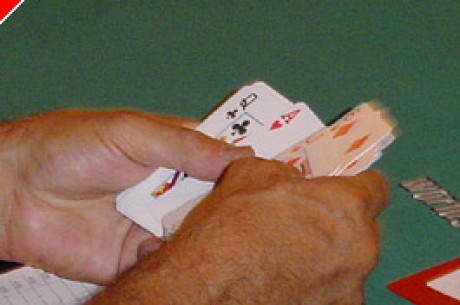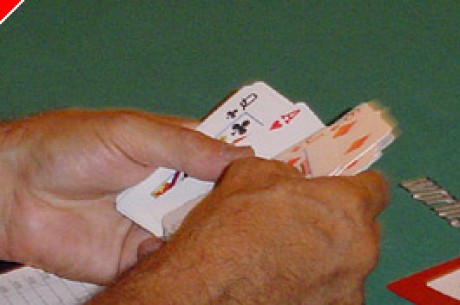Stud Poker Strategy - Beware Two Pair

I remember my friend Brian from elementary and middle school. He was a scrawny kid in elementary school. We picked him last for all of our pick up games of baseball or touch football or kickball. He was nice enough - just very small and thin,
When we got to junior high school he decided he wanted to be an athlete. Don't ask me why, but he did. He decided to go out for the wrestling team - where his tiny stature and minuscule weight could be an advantage I suppose. He started working out with weights. And that's where his troubles began.
He actually started to get stronger. Lifting weights does that. He gained a little bit of muscle mass and started to, in his diminutive way, bulk up. He went from being a 98 pound weakling to a 108 pound weakling. But still - he was 10% heavier and probably 20% stronger.
He started getting into fights with other boys - something he would not have even thought of doing when before he started lifting. He'd do to others the annoying things that bigger kids had always done to him - knocking people's books out of their hands, tripping people, making fun of kids, shoving people - things like that.
His recent weight gain and power surge had gone to his head. And he paid the price. Though he had the temerity to start a fight, he hadn't the stature to finish it. He got his clock cleaned by tougher kids more than a few times during our junior high days.
Why this somewhat peculiar story in a poker column? What does my friend Brian have to do with playing 7-Card Stud? It's a cautionary tale that should prepare you for how you should play two pair.
Two pair can be just the kind of hand that is strong enough to get you into trouble but not strong enough to get you out of trouble. I'm speaking of medium or low two pair. We all know how good a premium two pair can be. You have to be careful that you're not up against a higher two pair - but in general anything as good as Jacks up is a very good hand and should be played strongly.
But I'm concerned with middle and low pairs that make two pair. Hand like 7s and 4s, 9s and 2s - hands like that. The problem is that they look better than they are - and can often take the unthoughtful player into very expensive losses.
The problem with these hands is that they don't play very well heads up or multi-way. Against another player on fourth or fifth street - drawing to an over-pair - they are barely a favorite. And against two opponents they are a 35% dog to win the pot. And, since they consist primarily of middle and low cards, they are not as likely to scare away opponents as a high pair or two pair would - making your betting less likely to limit the field. They invite competition just as they are plummeting in value.
They are not a good drawing hand most of the time either. Though it's surely possible to make a full house from two pair, it's a long shot. You're more than twice as likely to draw your flush or straight. So unless the pot is huge, it doesn't make sense to chase with two pair against opponents with higher hands.
The key is to avoid the uncomfortable situation in the first place. Play your low and middle pairs carefully on Third Street lest you trap yourself with a truly mediocre two pair on Fourth and Fifth Street. Tend to fold the mediocre pair on third street to any pressure unless you have a large kicker. If you do end up playing a low pair with a poor kicker, fold to any pressure by Fifth Street if you haven't made trips. Recognize that if you just make two middling pair, your hand hasn't improved significantly.
Here's an example. You start with (4h9s)9h. The bring-in is to your left. There are three callers in front of you and you call. Five of you go to Fourth Street.
On Fourth Street you get a 4, giving you (4h9s)9h4d. A player to your left, with an AJ bets. Two players call. This is a loose $5/10 game. You can go ahead and call with your two pair, but you should be very cautious. Don't raise - it's not going to knock everyone out in this loose game where three players are already in for the $5.00. In fact, if you had noticed any 4s or 9s out, you should probably fold. The other players may already be far ahead of you - and your chances of making a full house would be two small to justify the three and a half large bets you'd most likely have to call to see the River.
On Fifth Street, if any of the remaining players showed signs of improving --- pairing any of their cards - and certainly if they paired their door card - you would have to fold even if your cards remained completely live. You should fold anyway if you believe that any of the players are ahead of you at the moment. Don't chase if you think there's a strong chance that even one of the remaining players is ahead.
You can play your middle pairs in a multi-way pot on Third Street - but you have to recognize that the card you need is the one that gives you trips - not a low two pair. Those two pair are trouble �� with just enough power to convince the inexperienced that they should mix it up with the rest of the crowd. It's like my friend Brain learned after a couple of bloody noses and a black eye.
If you're heads up after third street and make two a bad two pair, you should try your best to knock out your opponent. But if your opponent comes back strong from your aggression, tend to give him credit for a stronger hand and fold much of the time.
Here's an example of that. You were the bring in with (4s9s)9c. An Ace in early position raised and you called for the partial bet. On Fourth street he bet again. You caught your two pair with another 4. Try raising. If the Ace had been trying to steal the antes on Third and was just continuing the ruse on Fourth your raise may win you the pot. But if the Ace now re-raises you, fold the hand. He's telling you that he has Aces up or better (or that he's on to your trickery - in which case you should probably go for a walk after folding). With Aces up or better he is a huge favorite over your two pair. Don't chase him to the River hoping to catch a full house. Fold right there.
He may well call your raise. If so, don't push it on fifth. If he checks, you check. If he bets, you should fold - assuming that he now has two pair.
Two pair is surely better than one pair. But you have to learn that even though you are stronger, you may still not be strong enough to continue with the hand. Your strength may be just enough to get you into more trouble.
Ed note: Win a chance to go to the 2006 British Poker Open...on us at Poker Heaven








